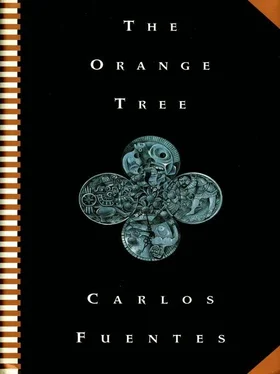You know your own insecurities. What? Could there be any security greater than that of being the grandson of Scipio Africanus, the victorious hero of the Second Punic War, the conqueror of Hannibal? You are his grandson, but only by adoption, and the mirror confirms that. You are someone else. You inherited nothing. In other words, you cannot be sure that through heredity your gifts will come to you naturally, biologically. Your grandfather Scipio Africanus says that to you every day from heaven: You will have to conquer the inheritance of our lineage on your own. The name Scipio is still not yours by right. You will have to earn it. You will have to emulate our virtues, be worthy of them. And to be worthy of the Scipios means as well to be worthy of Rome. In any case, simply by being a citizen of the capital of the world you would already have that obligation.
You see your image as an eighteen-year-old in the mirror your fifty-seven-year-old hand is holding, and you admit that everything, not only the stain of adoption, conspires against your obligation to be great. You’re apathetic. You learn with difficulty. It’s true that your adoptive family has subjected you to the rigors of the best patrician education, which is Greek. You have studied rhetoric, sculpture, and painting. You have learned to hunt, ride, and take care of your dogs. But your inclinations are not toward the disciplines but toward the pleasures. On horseback, in a forest, chasing a wild pig, with the dogs bringing up the rear, you are a happy boy. You add the pleasure of the other bodies to your own. That of the captured animal, whose cadaver you revive by embracing it. The cold nose, the warm spittle, the melancholy eye of a hound are your body reflected in another body that never thinks of the soul. Does a dog have a memory? Does a dog pass sleepless nights thinking about the divorce of its body from its soul? You pat the neck of your lead dog. It throbs in peace with itself. It is a single thing. You are two. You touch your neck. It has no bristles that would make it ugly, either at dawn or at nightfall. What you do have is a fear of uncertainty. Where does your soul begin, where does your body end? In the tremor of your body, the union of your mind and your guts? You exile the life of your flesh to south of your neck. But your head is left empty, divorced.
Son of consuls and censors, your true father, Lucius Aemilius Paulus, divorced your mother, Papiria, two months after your birth, as if you were the cause of the divorce. Abandoned, you and your brother, you were both adopted — by different families. How lucky you were to enter the clan of the Scipios, to inherit the fame of the conquerors of Hannibal and Perseus. Secretly unlucky, as your inheritance divided your soul from your body even more. Will you someday learn to whom you owe your spirit, to whom your flesh? You will deliver flesh to play, hunting, galloping, indiscriminate sexual love, the company of dogs that do not suffer as you do …
A Greek prisoner is delivered to your house, Polybius of Megalopolis, once leader of the Achaean League, the last effort for the independence of his nation. Your family chose him as a slave because they wanted to read his books. That’s how Polybius earned the protection of the Scipios. At first you avoided his company. He spent his time in the library, you in the stables. The tension between the two of you began to grow. He was fifteen years older than you but still young and goaded by the memory of his military experience in Greece. You laughed at him: bookworm, effeminate, owner of his head only, not his body. You didn’t need him. In those days you wanted to break a wild black stallion which had come from Africa along with other presents from Prince Jugurtha, nephew of Masinissa, ally of Rome and your family since the wars against Hannibal. What happened was foreseeable. The horse threw you. Polybius mounted and broke him. On the librarian’s bare chest you saw the scars left by Roman lances. Polybius’s chest was the map of his homeland.
“I will teach you to speak and comport yourself so you will be worthy of your ancestors.”
That is what this man, to whom you owe everything, said to you. In him, matter and thought, Greece and Rome, were united. He was not your lover, only your teacher, your mentor, your father. He calmed your anguish about the divided world, which had been the legacy of your childhood and the succubus of your nights. The sentiment your animal strength was already expressing, the power of your body, he reconciled, harmonized, infused with thought and reason: To honor Rome. To serve her. To obtain for your nation glory, fame, and military triumph.
But Rome had no books, only sentiments. Her literature did not exist; it was only rhetoric. The urns of triumph had to be filled, like the cask of the body, with the wine of thought and with poetry. Polybius taught you to think and speak like a Greek in order to act like a Roman. Hand in hand with him, you visited the Garden of Epicurus, Zeno’s stoa, Aristotle’s Lyceum, and Plato’s Academy. In the garden you learned to think and speak pleasure; in the lyceum you learned to moderate pleasure; in the stoa you discovered you were imperfect, although perfectible through virtue; and in the academy you learned to question everything. For example, though Polybius thought the logic of history was the unity of the world through Rome, thanks to the support that Fortune gave your country, he would instantly doubt his own assertion. History, he would say, has not only logic but meaning, and meaning consists in teaching us to withstand integrally the vicissitudes of Fortune by reminding us of the disasters of others. You will recall that lesson for your own campaigns. Your pride in what you are learning and in the person teaching it to you leads you one day to ask Polybius: “What shall we name our school?”
He answers that it will not be a school but a circle: the Scipionic Circle. You two will do important things, especially the translation of Greek thought into Latin terminology and the attempt to achieve poetry through public speech. Oratory would be the Roman school of virtue and action, which would be inseparable. Polybius and you spoke as well of the events of the day. The growth of the city of Rome. The arrival of slaves from conquered provinces to till the soil and the subsequent migration of peasants to the city, which congested it. The growth of luxury and financial manipulations. From Greece came knowledge but also the urge to live luxuriously. Many young men, Polybius would say, thought that being like Greeks was a matter of dissipating their energies in love affairs with other young men, courtesans, or in music and banqueting. A single example will suffice to show to what level of degradation Roman youth had fallen: it cost more to pay for the favors of a male prostitute than it did to buy a parcel of farmland, and if the daily wage of a peasant was thirty drachmas, a pot of pickled fish cost three hundred.
They talked about scandals, couples separating, illicit affairs, but also about the continuity of the family as an institution and their admiration for the matron Cornelia, daughter of your grandfather Scipio Africanus and mother of the Gracchi, your cousins. “May we see your jewels, madam?” “My jewels are my sons, sir.” Weren’t they both a bit strange, these impatient, rebellious young brothers? Didn’t they talk about equality? Can there be equality if there is no immortality? Is it only death that makes us equal? No, immortality itself can be selective: only select spirits rise to the celestial domain. Does that idea disgust you? Don’t you think at least that fame confers immortality and that, therefore, fame is always rather badly distributed? Do you accept fame but demand equality as well? Polybius suggests an intermediate route to you: Serve your nation well, use language, the gods’ gift to men, well, and you will have served both fraternity and glory.
Читать дальше












